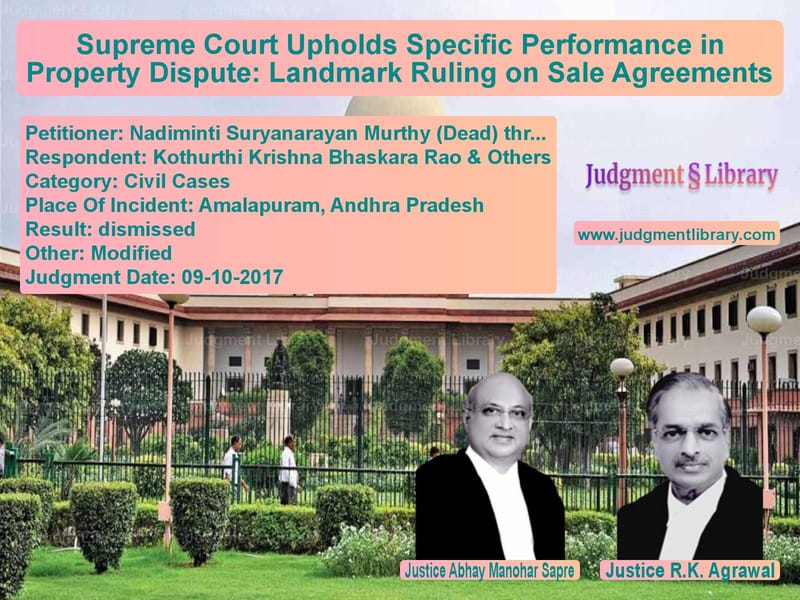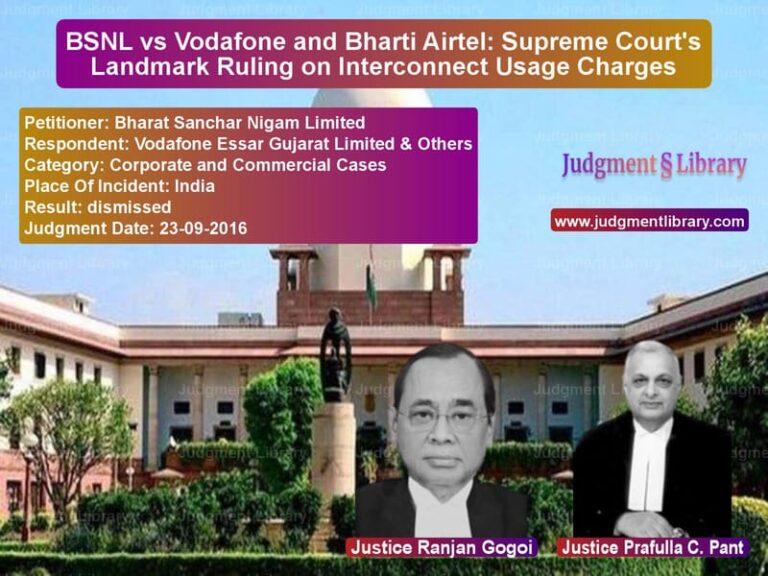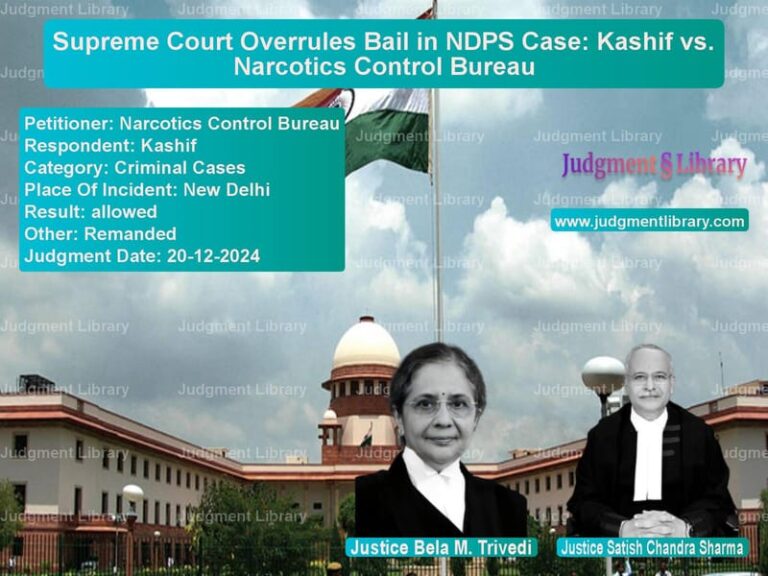Supreme Court Upholds Specific Performance in Property Dispute: Landmark Ruling on Sale Agreements
The case of Nadiminti Suryanarayan Murthy (Dead) through LRs. vs. Kothurthi Krishna Bhaskara Rao & Others is a significant ruling in property law, focusing on the enforcement of specific performance in sale agreements. This case underscores the importance of contractual obligations and the legal consequences when one party breaches a contract in favor of another purchaser. The judgment reaffirms that courts will protect the sanctity of agreements and ensure that justice prevails.
Background of the Case
The dispute revolves around a house property located in Amalapuram, Andhra Pradesh. The original owner, Surya Narayana, passed away in 1980, leaving his property to his wife with a life interest. His wife and children (defendants 1 to 5) later entered into a rental agreement with defendant 6 (the appellant) in 1981.
On 18.01.1983, defendants 1 to 5 entered into an agreement with the plaintiff (respondent 1) to sell the property for Rs. 46,000, receiving an advance payment of Rs. 1,000. The balance amount was to be paid at the time of registration, which was to occur within six months. However, instead of honoring this agreement, defendants 1 to 5 executed a sale deed on 09.02.1983 in favor of defendant 6 for Rs. 45,000, thereby violating their contractual obligation.
This breach of contract led the plaintiff to file a suit for specific performance of the agreement dated 18.01.1983, or in the alternative, for a refund of money and damages for the financial loss suffered.
Key Legal Issues
- Whether the agreement dated 18.01.1983 was legally enforceable.
- Whether the sale to defendant 6 was fraudulent and executed to defeat the plaintiff’s rights.
- Whether the plaintiff was ready and willing to perform his part of the contract.
- Whether defendant 6 had a valid claim as a bonafide purchaser.
Arguments by the Petitioner (Defendant 6)
- The agreement dated 04.01.1983 with defendant 6 was valid and executed before the agreement with the plaintiff.
- He had legally purchased the property for valid consideration and should not suffer due to the dispute between the plaintiff and defendants 1 to 5.
- The plaintiff was aware of his prior agreement but still entered into a subsequent agreement, knowing the risks involved.
Arguments by the Respondent (Plaintiff)
- The agreement dated 18.01.1983 was genuine, and defendants 1 to 5 had accepted an advance payment, confirming their commitment.
- Defendant 6’s agreement dated 04.01.1983 was created fraudulently to prevent the sale to the plaintiff.
- The plaintiff had arranged the balance amount and was ready and willing to perform his part of the agreement, but defendants 1 to 5 breached their obligation.
Observations by the Supreme Court
- The Court found that the agreement with defendant 6 was not genuine but was created to avoid executing the sale deed in favor of the plaintiff.
- The Court confirmed that the plaintiff had been ready and willing to perform his contractual obligations.
- Since the agreement with the plaintiff was legally valid, the subsequent sale deed to defendant 6 was ineffective.
- The Court highlighted that once a sale agreement is entered into, the seller cannot unilaterally violate its terms in favor of another buyer.
Supreme Court’s Judgment
- The agreement dated 18.01.1983 was upheld as valid and legally binding.
- The Court ruled that defendant 6 must join in executing the sale deed in favor of the plaintiff.
- Defendants 1 to 5 were directed to return the amount received from defendant 6.
- The sale deed executed in favor of defendant 6 was declared ineffective.
- The Court exercised its powers under Article 142 of the Constitution to ensure justice was done.
Impact of the Judgment
- The ruling reinforces that contracts must be honored, and courts will enforce specific performance when parties act in bad faith.
- It clarifies that subsequent transactions executed to defeat the rights of an earlier agreement will not be legally recognized.
- The judgment sets a precedent that property transactions cannot be manipulated to the detriment of legitimate buyers.
This ruling serves as a strong warning to property sellers that legal agreements cannot be ignored once entered into, thereby strengthening contractual obligations in real estate transactions.
Don’t miss out on the full details! Download the complete judgment in PDF format below and gain valuable insights instantly!
Download Judgment: Nadiminti Suryanaray vs Kothurthi Krishna Bh Supreme Court of India Judgment Dated 09-10-2017.pdf
Direct Downlaod Judgment: Direct downlaod this Judgment
See all petitions in Specific Performance
See all petitions in Contract Disputes
See all petitions in Property Disputes
See all petitions in Judgment by Abhay Manohar Sapre
See all petitions in Judgment by R K Agrawal
See all petitions in dismissed
See all petitions in Modified
See all petitions in supreme court of India judgments October 2017
See all petitions in 2017 judgments
See all posts in Civil Cases Category
See all allowed petitions in Civil Cases Category
See all Dismissed petitions in Civil Cases Category
See all partially allowed petitions in Civil Cases Category







